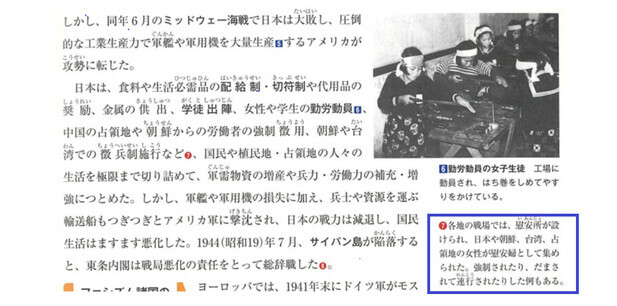hankyoreh
Links to other country sites 다른 나라 사이트 링크
[Editorial] Japan should begin making meaningful changes by correcting its textbooks

Among the twelve history textbooks that Japanese high school students will be required to study next year, only one mentions the coercive nature of the mobilization of the so-called "comfort women," who were forced to work in military brothels during World War II.
Eight of the 12 textbooks approved by the Japanese government mention the comfort women system, but most of them only briefly state that the system existed. Such textbooks are incapable of teaching the next generation of Japanese the historical fact that the comfort women system was an example of wartime sexual violence.
This is an extremely unfortunate development that entirely disregards the 1993 Kono Statement, in which the Japanese government acknowledged the coercion faced by the comfort women and promised to use history education to ensure this issue isn't forgotten.
The outcome of this history textbook assessment is important because, as of next year, "integrated history," combining Japanese history and world history, will become a required subject for Japanese high school students.
The only history textbook that mentions the comfort women system's coercive nature is one published by Yamakawa. And even there, the explanation appears not in the body of the text but in a footnote. The other textbooks briefly describe the system or only mention postwar compensation without even explaining what the system was.
The Japanese government has criticized South Korea for not abiding by the comfort women agreement that the two countries reached on Dec. 28, 2015. But this textbook assessment makes clear which government hasn't been keeping its side of the bargain.
In the statement released in April 1993 by then Chief Cabinet Secretary Yohei Kono, Japan acknowledged the coercive nature of the comfort women's recruitment and their lives in the comfort stations. The Kono statement also promised to "face squarely the historical facts […] instead of evading them" and expressed a "firm determination never to repeat the same mistake by forever engraving such issues in our memories through the study and teaching of history."
Nothing of the kind can be found in this batch of history textbooks. The crux of the comfort women issue is that the comfort women were subjected to unerasable war crimes. It's the Japanese government and Japanese society's responsibility to teach that historical truth to future generations.
Some history textbooks describe Japan's imperial aggression in Asia as "expansion." That's shockingly reminiscent of the 1982 scandal over historical distortions in Japanese textbooks that described Japan's aggression against Korea as "expansion" and said that Japan had "received" Korea's authority over foreign policy, rather than usurping it.
The Japanese government's claims that Dokdo is Japan's integral territory and that Korea illegally occupies the island also appear in most of the textbooks.
Unless the next generation has a correct understanding of history, South Korea-Japan relations are unlikely to have a bright future.
Our advice to Japan is to face the truth of history courageously. Meaningful change could begin with correcting the passages in these textbooks.
Please direct comments or questions to [english@hani.co.kr]

Editorial・opinion
![[Column] When ‘fairness’ means hate and violence [Column] When ‘fairness’ means hate and violence](https://flexible.img.hani.co.kr/flexible/normal/500/300/imgdb/original/2024/0516/7417158465908824.jpg) [Column] When ‘fairness’ means hate and violence
[Column] When ‘fairness’ means hate and violence![[Editorial] Yoon must stop abusing authority to shield himself from investigation [Editorial] Yoon must stop abusing authority to shield himself from investigation](https://flexible.img.hani.co.kr/flexible/normal/500/300/imgdb/original/2024/0516/4417158464854198.jpg) [Editorial] Yoon must stop abusing authority to shield himself from investigation
[Editorial] Yoon must stop abusing authority to shield himself from investigation- [Column] US troop withdrawal from Korea could be the Acheson Line all over
- [Column] How to win back readers who’ve turned to YouTube for news
- [Column] Welcome to the president’s pity party
- [Editorial] Korea must respond firmly to Japan’s attempt to usurp Line
- [Editorial] Transfers of prosecutors investigating Korea’s first lady send chilling message
- [Column] Will Seoul’s ties with Moscow really recover on their own?
- [Column] Samsung’s ‘lost decade’ and Lee Jae-yong’s mismatched chopsticks
- [Correspondent’s column] The real reason the US is worried about Chinese ‘overcapacity’
Most viewed articles
- 1[Column] US troop withdrawal from Korea could be the Acheson Line all over
- 2China calls US tariffs ‘madness,’ warns of full-on trade conflict
- 3[Column] When ‘fairness’ means hate and violence
- 4Could Korea’s Naver lose control of Line to Japan?
- 5[Editorial] Yoon must stop abusing authority to shield himself from investigation
- 6Naver’s union calls for action from government over possible Japanese buyout of Line
- 7Several victims of Jeju Massacre still remain unaccounted for
- 8The quest to rediscover Jeju’s lost towns and villages
- 9Self-driving buses, taxis to hit roads in Seoul in October
- 10A Korean production studio may have made your favorite show – even if you don’t watch K-dramas